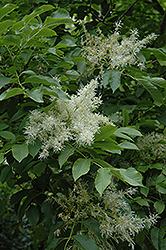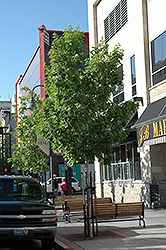It's all about ...
plants

Height: 50 feet
Spread: 45 feet
Sunlight:
![]()
Hardiness Zone: 7a
Other Names: Manna Ash
Description:
A very attractive shade tree valued for its showy white flowers in late spring, memorable when in bloom and a neat and tidy landscape tree the rest of the year; not common in commerce but worth seeking out for the home landscape
Ornamental Features
Flowering Ash features showy panicles of fragrant white flowers hanging below the branches in mid spring. It has dark green deciduous foliage. The compound leaves turn an outstanding yellow in the fall. The smooth gray bark adds an interesting dimension to the landscape.
Landscape Attributes
Flowering Ash is a deciduous tree with a more or less rounded form. Its average texture blends into the landscape, but can be balanced by one or two finer or coarser trees or shrubs for an effective composition.
This is a relatively low maintenance tree, and should only be pruned in summer after the leaves have fully developed, as it may 'bleed' sap if pruned in late winter or early spring. Deer don't particularly care for this plant and will usually leave it alone in favor of tastier treats. It has no significant negative characteristics.
Flowering Ash is recommended for the following landscape applications;
- Accent
- Shade
Planting & Growing
Flowering Ash will grow to be about 50 feet tall at maturity, with a spread of 45 feet. It has a high canopy with a typical clearance of 7 feet from the ground, and should not be planted underneath power lines. As it matures, the lower branches of this tree can be strategically removed to create a high enough canopy to support unobstructed human traffic underneath. It grows at a medium rate, and under ideal conditions can be expected to live for 70 years or more.
This tree should only be grown in full sunlight. It prefers to grow in average to moist conditions, and shouldn't be allowed to dry out. It is not particular as to soil type or pH. It is highly tolerant of urban pollution and will even thrive in inner city environments. This species is not originally from North America.
This plant is not reliably hardy in our region, and certain restrictions may apply; contact the store for more information.

